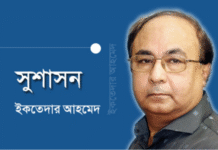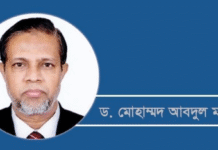Aaqib Md Shatil
The Bangladesh-India match reminded many of the January 5 election
At last, the BNP, desperately counting on its international friends to put an end to the current political stalemate, has found two new friends in Aleem Dar and Ian Gould — who have made the prime minister of the country, Mrs Sheikh Hasina Wazed, understand the necessity of fair umpiring in a game.
It seemed that the prime minister of the People’s Republic of Bangladesh has realised how important it is to have fair umpires to ensure fair play on the field on March 19, when the national cricket team of the country faced India in their quarter-final match on Melbourne Cricket Ground. After the match, our PM remarked that the national cricket team of India would not have been able to defeat Bangladesh had there been no umpiring errors.
The comments came after the shocking defeat of Bangladesh by India in the ICC Cricket World Cup 2015 due to some very controversial and partial decisions of the umpires who were assigned to foresee the match. However, the International Cricket Council (ICC) backed the umpires and their controversial calls in the field.
Let us take a look at what happened one year and three months ago, on January 5, 2014, when an election was held leaving half of the population of the country disenfranchised and letting 21 people die within 24 hours on the election day.
The election was largely boycotted and deeply disputed as only 12 of the total 40 registered political parties had taken part. 153 members of the parliament were elected uncontested in that election, while not a single vote was cast in at least 40 polling centres.
The turnout was low, while reports of extensive rigging were found on the pages of national dailies on the very next day of the election. Though the Election Commission had estimated that the turnout was 40%, unofficial accounts suggested that the turnout never exceeded 20-30%. London-based magazine The Economist termed it a farcical poll.
The “umpires” of that poll, the election commissioners, were criticised for their role during the election. 19 candidates, mostly rebels of the ruling party, boycotted the polls alleging massive rigging. However, their “ICC,” the interim government led by the AL chief, backed the Election Commission by thanking them for conducting the election.
The Bangladesh-India match reminded many of the January 5 election. And for those who argue that BNP should have participated in the January 5 polls, the second quarter final of the ICC Cricket World Cup 2015 can be an eye-opener.
Had BNP joined the polls, they would have been made to lose it, the way Bangladesh was made to lose against India. And after the poll, with no possibilities of change in the result, there would have been a crying BNP, shocked by the result, angry over the whole thing, just like Bangladesh was after the match.
The BNP’s participation in the election could have hardly made any change; rather, it would have given the poll the credibility it needed. Boycotting the election was the best possible option the BNP had.
Let us compare these two events again: In cricket, umpiring errors are not a very rare case, in other words, controversial decisions of the umpires, especially in matches against the comparatively weaker teams, are very common in cricket. But when it comes to the World Cup, the tournament from where the cricket world gets their champion for the next four years, the umpires need to be very careful on the field.
The same goes for the elections in Bangladesh. Voting errors, rigging, stuffing, etc are not very uncommon experience in Bangladesh, especially during the local government elections. But when it comes to the national election, the whole process must be carried out fairly and by a credible authority, since national elections decide who the ruler of the country will be for the next five years. There are undoubtedly certain differences between a local body election and a national election. A neutral and credible authority is a must to foresee the national one.
In the quest for a credible authority to conduct the national election, it was AL who led a movement and established the caretaker government system in 1996. And again it was the AL who scrapped it from the constitution in 2011 after a Supreme Court appellate division verdict. The abolishment of the caretaker government system sparked violent protests all across the country, and ruined the economy in the process.
On the other hand, hundreds of people have been killed either by bomb attacks or by police firing, while a handful of opposition leaders and activists, including a former state minister, have been forcefully disappeared since the abolishment of the caretaker government system came in effect. A non-stop blockade has been carried on by the opposition throughout the country since January 5 of this year, which has rendered district-level businesses dysfunctional.
It is high time we realised the actual crisis in Bangladesh, which has emerged due to the lack of trust between the parties. Bangladesh is badly in need of a number of fair umpires, a credible authority to foresee the next general election, whenever it takes place. And dialogue must be initiated between the major political parties to sort it out. The sooner, the better.
Source: Dhaka Tribune










